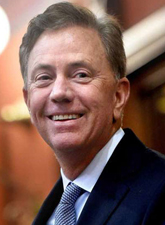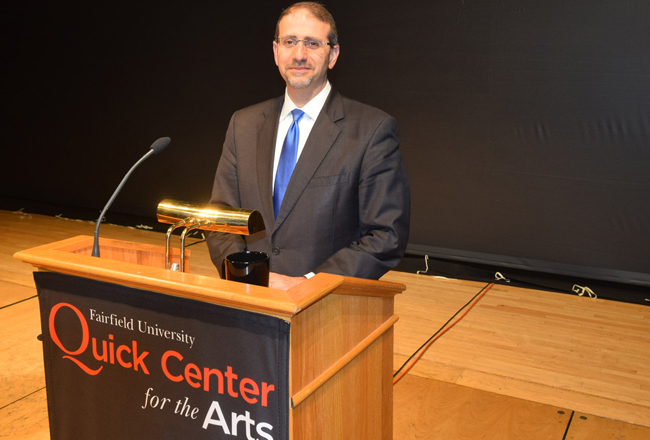Gov. Ned Lamont used his March 22 address at the Ethan Allen Hotel in Danbury to paint a positive picture of Connecticut”™s future, although he warned that improvements “are not going to happen overnight.”

Speaking to a crowd of more than 400 at the Greater Danbury Chamber of Commerce event, Lamont discussed his plan to bring back tolls, encouraged public-private partnerships to work on a number of issues ranging from economic development to education, and talked about managing “a $20 billion company, which the state of Connecticut is.”
The governor also touted the fact that Standard & Poor”™s recently upgraded the state”™s bond rating ”” the first such increase by a rating agency in 18 years ”” from “stable” to “positive.”
“They know that things are changing in Connecticut,” he said. “They can feel some of that enthusiasm, that there is a lot of wind at our back.”
Lamont”™s controversial tolls plan, which if passed has been estimated to bring in as much as $1 billion in annual revenue, is a key part of “getting our fiscal house in order,” he said. Maintaining that he understood concerns from residents and employers alike over tolls ”” Danbury Plumbing Supply owner T.J. Hunt said that tolls would result in paying a higher freight rate for the importation of goods from other states ”” the governor insisted that, with “maximum discounts” for local drivers and “frequent fliers,” the measure would prove to be a net positive.
The governor also promised to address the state”™s rail system, which he said is on average 20 minutes slower than it was 20 years ago. Fixing that “will be transformative,” he said.
Turning to what he termed the state”™s “pension crisis,” Lamont said he was particularly bothered by the terms of the Teachers Retirement System (TRS) fund. “I don”™t know who did that bond,” he said, “but they should be hit for malpractice.”
Although he said “I”™ll be blunt” numerous times during his presentation, the governor used much of his 20-minute address to repeat promises he”™s made in the past: placing the state on a “debt diet,” wiring cities with 5G networks as quickly as he can, reducing trips to the Department of Motor Vehicles and having an open-door policy for businesspeople (“Come up and see me some time,” he quipped).
During a 40-minute question-and-answer period, Lamont again said he hoped to rely on the business community to work with Connecticut”™s universities and colleges to come up with ways to keep graduating students employed in the state, twice mentioning student-loan forgiveness as one possibility.
He also acknowledged that he”™s received “a lot of pushback” on his plan to expand the sales tax to purveyors of a number of previously exempt products and services. “The barber shop lobby, the car wash lobby ”” we”™ll listen to them,” he said.
Lamont also noted his plan to open and staff the state”™s five highway welcome centers on a 24/7 basis, unveiled in mid-March, saying, “it”™s an embarrassment” to be trying to encourage business to come to the state when the only things active in the welcome centers are the porta potties.
He also mentioned efforts to wean the state off its reliance on electric power in favor of wind, solar and other alternative energy sources. “Our electric grid is as antique as our transportation system,” he said.
In attendance were such Fairfield County municipal leaders as First Selectmen Matt Knickerbocker (Bethel), Steve Dunn (Brookfield), Dan Rosenthal (Newtown) and Rudy Marconi (Ridgefield) as well as Danbury Mayor Mark Boughton.
Boughton said the city registered more than 900 new businesses last year and has one of the state”™s lowest unemployment rates.























NEW TAX NED